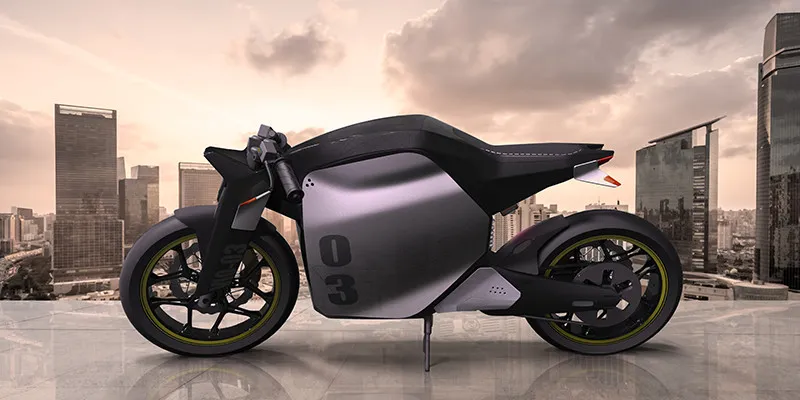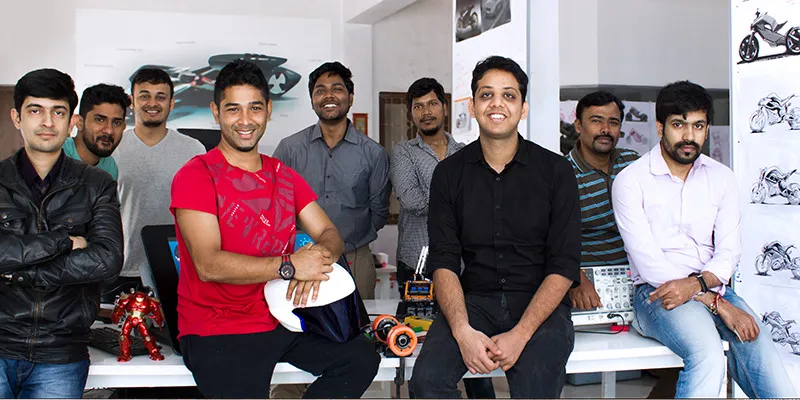Ultraviolette: Not the next 'Avengers' movie, but a sporty bike and battery tech startup
Wires, batteries, boards, ICs and packs lie on the floor of this 900 square foot office. The setup reminds one of the Iron Man or Avengers movies, where the protagonist is continuously innovating in his basement. But while Tony Stark has the help of Jarvis, a largely fictional artificial intelligence platform, here in Bengaluru, the tech goes beyond the realm of science fiction.

The 10-member team at Ultraviolette Automotive is stitching together a sleek looking bike at the startup’s studio. Early in the morning, between 7 and 8 am, on the roads of Bengaluru’s Jayanagar locality, youngsters waiting for their college bus are treated to the sight of a top-notch sports bike being tested, its skeletal frame rocketing by at some speed.
Founders Niraj Rajmohan and Narayan Subramaniam have known each other for more than a decade now. They competed with each other in school for the top rank, and this fierce competition continued in BMS College of Engineering. But to their surprise, they eventually befriended each other, becoming partners in college. The duo won or finished second in most of the creative engineering contests in the city. “We had a common interest in design, engineering, automobiles and the future of mobility,” say the two 29-year-olds who founded Ultraviolette Automotive in December 2014.
Ultraviolette is not just an electric vehicle company that sells the concept of going green. The team at the startup wants to combine style, speed, aspiration and luxury into one mean machine. Think along the lines of the bikes in Tron. Completely self-funded, they have invested less than Rs 50 lakh, and it’s not with their bike that the duo hopes to make a dent in the Universe. Their secret sauce is the battery, the battery management system and the network of energy management systems, which will allow their customers to charge their battery in the same manner as fossil fuel drivers go to a petrol station today.
A delightful journey
While they parted ways after engineering, Niraj and Narayan remained in touch. Narayan went from engineering school to the National Institute of Design, where he continued his winning streak in design competitions. Then, he went on to the Umea University of Sweden to finish another course in design. His exploits as a good designer soon caught the eyes of Daihatsu and Volkswagen between 2013 and 2014. Niraj went on to work in Yahoo and NetApp, and also ran a startup. He did his MBA in the Philippines.

In January 2014, the two friends met in Bengaluru and began looking at what was missing in the automobile industry. The design element and electric platforms played a major role in their thought process. “Every automobile maker is betting on electric platforms over the next decade. We realised that the opportunity to build such platforms for India is big,” says Narayan. Globally, since 2012, there has been a push towards the electrification and hybridisation of cars. In India, Altigreen, a platform to make cars hybrid, recently raised Rs 20 crore, and Ather Energy, the electric scooter manufacturer, first raised Rs 67 crore, followed by a larger round of Rs 200 crore from Hero MotoCorp recently.
“The interest in hybrid and electric vehicles across the world is gathering steam. Most of the companies have invested R&D on electric platforms,” says Vijay Ratnaparkhe, MD of Robert Bosch Engineering India Ltd.
In a report by Navigant Research, global e-bike sales are expected to grow from $15.7 billion in 2016 to $ 24.4 billion in less than a decade. India has absolutely no numbers to show on the subject at present, and the opportunity for sleek electric bikes over the next decade, provided the existence of a network of battery stations, is at least 100,000 units across the country.
The business model
The company has already crafted business plans to sell its bikes, which will be available online by the end of next year. It does not wish to reveal the cost of the bike given that work is still being done on the battery systems and the network. Narayan and Niraj are now in fund raising mode to further their R&D.
“The challenge is to ensure that the company is ready with its delivery plans in the next two years,” says Niraj. Both founders are hard at work creating cloud-based platforms that could interface with the bike and the customer.
In their free time, to take their minds off the grind, both founders are building action figures based on Gundam, a Japanese robot anime series. “These are complex toys, and we spend time building action figures to keep our minds focused on the detail that is going into the business,” say the two founders. No wonder these guys are design freaks.
They are also building cool designs for their battery packs. A 1KW battery pack costs $250 dollars. Now that is why a Tesla with its 120KW battery is that expensive. These guys are building a bike that will compete with the KTMs and the Kawasaki Ninjas out there on Indian streets. Aficionados should check out their bike, as well as their lab in Jayanagar.
Niraj and Narayan are quick to point out that the name Ultraviolette was created to sound catchy, and not to remind one of a SciFi character with a similar moniker. The two of them have their work cut out for them going forward, and are working on a deadline to go commercial.







